Intermarkets' Privacy Policy
Donate to Ace of Spades HQ!
aceofspadeshq at gee mail.com
Buck:
buck.throckmorton at protonmail.com
CBD:
cbd at cutjibnewsletter.com
joe mannix:
mannix2024 at proton.me
MisHum:
petmorons at gee mail.com
J.J. Sefton:
sefton at cutjibnewsletter.com
Plus: FBI Raids LA School Superintendent's Home, School District Offices
BAFTA Tourettes Incident Pits the People Who Cancel Over #Racism Against the People Who Cancel Over "Abelism"
CNN: The Economy Is Doing Pretty Well, Just as Trump Claims.
Too Bad It's a Boomcession That Is Leaving So, So Many People Behind.
Democrat "Counter Event" To the SOTU Is, Literally, a Zoo of Lunatics
Trump Directs and Films the Main Political Advetisement for the Midterms
Wednesday Morning Rant
Mid-Morning Art Thread
The Morning Report — 2/25/26
Daily Tech News 25 February 2026
Tuesday Overnight Open Thread - February 24, 2026 [Doof]
Jim Sunk New Dawn 2025
Jewells45 2025
Bandersnatch 2024
GnuBreed 2024
Captain Hate 2023
moon_over_vermont 2023
westminsterdogshow 2023
Ann Wilson(Empire1) 2022
Dave In Texas 2022
Jesse in D.C. 2022
OregonMuse 2022
redc1c4 2021
Tami 2021
Chavez the Hugo 2020
Ibguy 2020
Rickl 2019
Joffen 2014
maildrop62 at proton dot me
Saturday Gardening Thread: Capitalism Edition [Y-not, Weirddave, KT]
Inspired by KT's highly informative section on gardening catalogs (below), this Capitalism Edition of the Saturday Gardening thread is brought to you by "Money doesn't grow on trees... or does is?"
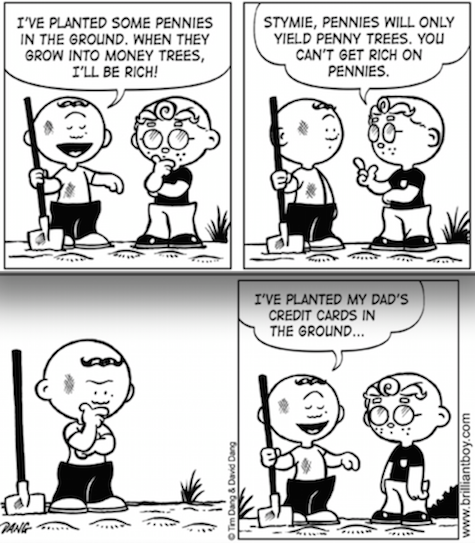
As I recall, many months ago we alluded briefly to Victory Gardens, a movement that has been semi-revived by some private folks, but here's a brief refresher course:
As part of the war effort, the government rationed foods like sugar, butter, milk, cheese, eggs, coffee, meat and canned goods. Labor and transportation shortages made it hard to harvest and move fruits and vegetables to market. So, the government turned to its citizens and encouraged them to plant "Victory Gardens." They wanted individuals to provide their own fruits and vegetables.
Nearly 20 million Americans answered the call. They planted gardens in backyards, empty lots and even city rooftops. Neighbors pooled their resources, planted different kinds of foods and formed cooperatives, all in the name of patriotism.
How effective were they?
Families were encouraged to can their own vegetables to save commercial canned goods for the troops. In 1943, families bought 315,000 pressure cookers (used in the process of canning), compared to 66,000 in 1942. The government and businesses urged people to make gardening a family and community effort.
The result of victory gardening? The US Department of Agriculture estimates that more than 20 million victory gardens were planted. Fruit and vegetables harvested in these home and community plots was estimated to be 9-10 million tons, an amount equal to all commercial production of fresh vegetables. So, the program made a difference.
These days many are motivated to garden for a variety of reasons, some for entertainment value or exercise, but many for the chance to control where their food comes from and what has been done to it during the growing process.
Myself, I am not particularly fond of the "organic" food movement. I think it's a bit of a sham preying on peoples' fears about food and based on some questionable "science." (If you like it, go for it, but don't lecture me about it.) I decided to dip my toe into vegetable gardening because I like to cook and I enjoy having access to some grocery items that might be hard to find (or very expensive) in my small and rather unimaginative local grocery stores. I've bought Padron peppers by mail, but they are insanely expensive and their availability is limited. Likewise, herbs are marked up to a crazy extent -- plus they don't keep all that well in the fridge, so I prefer to be able to harvest it fresh as needed.
In any event, we've been at it for two years so far. The second year was much easier since we didn't have a lot of prep to do to get the raised beds we'd built in year one ready to go. I even had most of my herbs survive the winter, so that saved me from having to buy and plant new ones (except for cilantro and basil, of course).
I did not keep careful track of our expenses or yields, but I doubt very much we're even close to breaking even yet. We may someday, but for now given that I do not start most of my veggies from seeds (that'd be another expense to set up the lights etc to do that) and I'm not the most careful gardener in terms of my planning or upkeep, I wonder if we'll ever wind up with a particularly high return on investment (ROI). I'm fine with that because that's not my primary goal. YMMV.
I thought it would be fun to scout the literature and see what I could find with respect to the economics of gardening. A few samples follow:
How much do we spend on gardening? Here's an estimate from an academic paper:
On average, home vegetable gardens produce $677 worth of fruits and vegetables, beyond the cost of $238 worth of materials and supplies. Local environmental conditions, gardening practices, and crop choices will influence the actual net value realized by individual gardeners.
This blogger attempted to estimate the ROI for a home garden of two sizes, 400 sqft and 100 sqft (400 sq ft data shown below):
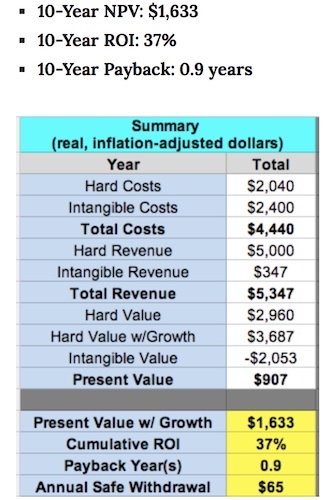
So a 400-square-foot garden saves you $1,600 over 10 years. This is only $160 per year on an average annual basis, which isnít that exciting, especially considering that the ROI is a measly 37% and the garden is pretty big! A low ROI means that you have to invest a lot of money just to earn a little bit of additional revenue. It ties up your free cash more so than something with a higher ROI. But the point of the whole thing is that it DOES save you money to grow your own fruits and vegetables. Gardening costs are high, but retail prices are higher.As a reminder, my analysis includes labor/time costs. So Iím estimating about 1/10 of an hour for every square foot, or 40 hours of work for the year in this example. I valued my gardening time at $6.00 per hour versus my normal estimate of $10.00 per hour because gardening isnít ALL work.
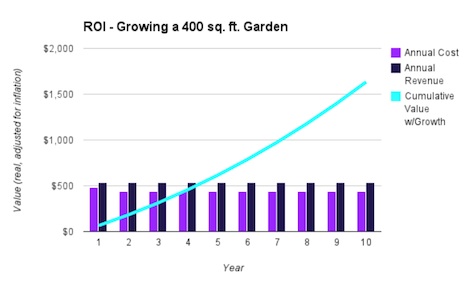
Very thorough, but I think he's underestimated the first year costs. Mine were considerable since they included building five raised beds (for a total of about 100 sqft). Also, we needed a few extra tools at the beginning. Perhaps he had fewer issues -- better soil or existing tools or in-ground gardens -- but I'd still guess the start up costs are higher than he's implying in this chart.
We also spent a small fortune in Salonpas to treat our old, out of shape bodies! LOL
Another blogger's calculations (this from 2009):
As with any growing season, there were hits and misses. The heaviest and most valuable crop was our tomatoes (158 lb/72 kg for a total value of $524). In terms of misses, our apple tree decided to take the year off and very few of our onions started from seed made it requiring me to buy onion plants.On the cost side, we had $130 for seeds and supplies, $12 for a soil test, and exceptional costs of $100 for some locally-made organic compost we bought for our ďThis Lawn is Your LawnĒ frontyard garden (normally, we meet most of our soil fertility needs through our own composting). I don't have a scientific calculation for water costs, but we don't need to water much and, when we do, water is relatively cheap in Maine. Also, I mulch my beds pretty heavily to keep moisture in and weeds down. Let's say $40 in water. So, if we consider that our out-of-pocket costs were $282 and the total value generated was $2431, that means we had a return on investment of 862%.
Finally, this article describes some ways you might keep your gardening costs down:
Some vegetables are particularly cheap to grow. Tomatoes are affordable and easy to grow, as are zucchini and yellow squash. Lettuce, peppers, and cucumbers are also a good choice. These plants are relatively cheap to purchase in seed or plant form, and can provide a delicious alternative to spending a lot of money at the grocery store.Fruit trees can be another great way to save money by gardening, but of course they are harder to grow than some vegetables because you have to have the write space and climate. If you canít grow fruit trees, you can at least plant berry bushes. Strawberries, blueberries, raspberries, and blackberries can all be very expensive to buy at the store, particularly if you enjoy eating organic food, so growing your own can be a great way to cut costs. Most bushes donít require sprays, and they also can start bearing fruit the year after they are planted. They also require very little space, and if you plant several different kinds, you can have berries for a longer amount of time.
In addition to picking fruits and vegetables that are easy to grow, you can also save money by carefully choosing the location of your garden. Different plants require different amounts of sunlight, and knowing what your plants need will help you have an abundance of food to eat, and will minimize waste. According to Organics By Gosh, composting can also help you save money on your water bill, trash bill, and lawn maintenance.
What has been your experience about the costs (and returns) on gardening?
What money-saving tips have you found over the years?
And now, here's KT with some gardening catalogs to tempt you...
BABY, IT'S COLD OUTSIDE
This song has really become popular lately. It has been cold outside. While Mark Steyn waits for the official video of the Ron Paul/Sandra Fluke duet to come out, maybe we could snuggle in front of a fire with some Dreamy Winter Catalogs.
Other Morons and Moronettes are more familiar with catalogs for ornamental plants, so I'll just mention a few catalogs featuring pretty photos of vegetables to get us started. These may not be the catalogs you end up ordering from, but they're nice to look through and mark up as you plan for the arrival of warmer weather:
Dreamy Winter Catalogs
When I first received this catalog in the mail years ago, it was mostly in black and white, with good variety descriptions. Now it features showy photos of vegetables, but less prose in the descriptions. This catalog includes several specialty selections, like a chive with blossoms in the form of baby chives.
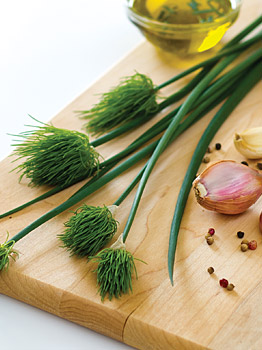
I thought Cook's were expensive in years past. They are more expensive now. But if you want something unusual for the kitchen, check out this catalog.
Recipe: Radish and Baby Cabbage Salad
"Cooking will mellow the spicy radish while adding an exciting hint of color."
Baker Creek offers only heirloom and open-pollinated selections. I have always ordered from their website, but this year they sent me a copy of the print catalog they've been hyping for a while. It's a big one. I expect that it kept a photographer pretty busy. I never paid much attention to their flower seeds before. They are also offering plants now.

I will probably continue to order through their on-line catalog, which includes smaller photos of most selections, plus customer reviews. But their print catalog is fun to look through.
Park is one of the older seed houses in the USA. They went through a period recently during which the new president of the company seemed to be trying to transform herself into the Martha Stewart of Seeds. I don't think this plan went very well. They seem to be over that now. I just got the 2015 catalog, and it looks nice. I appreciate their practice of including details like specific disease tolerance of tomato cultivars.
Their headquarters is in South Carolina, and they feature some southern-adapted veggies. They also carry a wider selection of flowers than many catalogs featuring veggies. The flower below is an All America Winner. It is widely available:

The founder of the Burpee Seed Company, Washington Atlee Burpee, was one of America's more colorful seedsmen. This company history provides an interesting perspective on American history, too. The famed plant breeder Luther Burbank (Burbank Russet Potato, Santa Rosa Plum) was W. Atleeís cousin. Burpee Seeds inherited his breeding "stud book".
W. Atlee's son David took some cues from P.T. Barnum and Napoleon in developing publicity campaigns. The current Burpee catalog is enticing, but the unusual publicity campaigns seem to be pretty much a thing of the past. People still look forward to seeing the new plants featured in the catalog each year. Unfortunately, some of these are winners and some are losers. And some good varieties are dropped to make way for novelties.
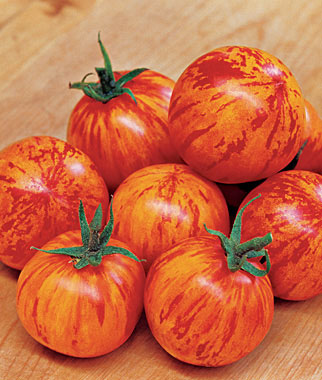
I'm afraid that Burpee's marketing strategy is taking precedence over some other important elements of their business at present. They have a multi-faceted approach to marketing. The catalog likely drives sales for their substantial non-catalog business. Catalog prices are high, even for old standards available elsewhere more cheaply -- even in Burpee's own retail seed packets. You may be able to get a deal on a catalog order by signing up for their e-mail notices. This is also true for several other print or on-line catalogs.
Burpee irritates serious gardeners by re-naming varieties with Burpee "marketing names" and by capitalizing on the developments of small growers without giving them credit. Their variety descriptions often leave out important details.
I usually (but not always) limit purchases to their proven, exclusive, catalog-only varieties. The "customer favorites" are usually safe bets. I'll describe some of my favorites in the comments if anyone is interested.
Here's a history of The Other Burpee. The originator of this exercise, now popular with the Hollywood set, seems to have thought that it was too strenuous to perform regularly. In my case, he was right.
I am including a video demonstration in case you want to get Hot at Home. It may be a long time until you see another exercise video featured on the Saturday Gardening Thread. Pushups not included. Sorry. I think that version of The Burpee would leave me Hobbling at Home.
While we're on our feet, our progressive friends at Mother Earth News move us to the kitchen table with our pile of marked-up catalogs and maybe a laptop for the actual garden planning process. "Dream Big -- but then, reality sets in". So many possibilities...
Many garden dreams involve tomatoes. Tomato breeder Fred Hempel recommends five places to find interesting tomatoes, including tomatoes (and other veggies) for the greenhouse. I have a couple of additional favorite sources. Below, a photo of Fredís Maglia Rosa, also discussed in this Tomatoville thread. Adapted to cool summers. Best for intensive greenhouse culture or big patio containers. Peak flavor before peak color.
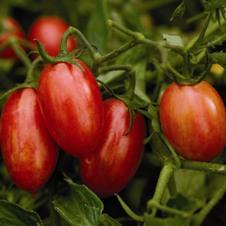
Y-not: Thanks, KT! I wanted to add a link to this post about seed germination from the blog NW Edible. Seemed timely.
Now, here's Weirddave:
All I've got is a question for the horde that was posed to us this week:
It's winter. There's not much to do in the garden, except plan for the good weather, and that's the question. What should we as gardeners be doing to plan for spring, and how much work should we put into it? To put it another way, everyone would love to wave a magic wand and have acres of land producing bumper crops, but that's not happening. It may be possible, but it may also take years. It will definitely take lots and lots of work. Does anyone have any ideas about how we can plan sequentially, to have the garden of our dreams X years from now? This is a fascinating subject, and I'd love to get some feedback on it.
Y-not: As it turns out, Mr and Mrs JTB have requested a post on garden planning which KT and I plan to address in a future Gardening Thread:
My husband and I enjoy the AOSHQ gardening thread. Recently as we sipped hot chocolate and coffee, read seed catalogs, and viewed gardening websites, we looked at each other and said "what exactly do we want our yard and gardens to look like 5-10 years from now. Maybe we need a plan." Like many people, we need to be realistic regarding resources (retired), acreage (1/4 acre lot), interruptions of maintenance (emergency visits for aging out-of-state parents), and our own "seasoned" muscles and joints. Perhaps a future topic might be: Horde thoughts on how to create a long-term plan that would result in a beautiful, simple to maintain, relatively inexpensive landscape (e.g., design ideas, tools, things to consider, etc.).
Let us know if there are any specific things you'd like to see covered and we'll do our best to address them.
To close things up, any of you old-timers remember this one?
What's happening in YOUR gardens this week?
Send tips, questions, requests, brags, and cases of Valu-Rite to Y-not on Twitter @moxiemom or to bailesworth at gee mail dot com.
Warai-otoko : "How the hell did "tourettes guy at the BAFTA award ..."
Crusader: "I had forgotten that she had hit another house bef ..."
Boss Moss: "Not much of a driver. ..."
tubal: "Here in Missouri tic season is nearly upon us. ..."
washrivergal: "Yet it’s ruled an accident and she had no im ..."
toby928(c): "I saw Stalk of Knickers open for Blood, Sweat, and ..."
Spaulding Smails: "brown boogers Those're eating boogers! Posted ..."
eleven: "Thank you toby. ..."
I don't even know what means: "Now has nics of stalkers. Posted by: ChristyBlink ..."
Diss Topian: "[i]372 AtC isn’t here anymore because some o ..."
Oldcat: "it a garage door at an apartment complex, people t ..."
Plus: FBI Raids LA School Superintendent's Home, School District Offices
BAFTA Tourettes Incident Pits the People Who Cancel Over #Racism Against the People Who Cancel Over "Abelism"
CNN: The Economy Is Doing Pretty Well, Just as Trump Claims.
Too Bad It's a Boomcession That Is Leaving So, So Many People Behind.
Democrat "Counter Event" To the SOTU Is, Literally, a Zoo of Lunatics
Trump Directs and Films the Main Political Advetisement for the Midterms
Wednesday Morning Rant
Mid-Morning Art Thread
The Morning Report — 2/25/26
Daily Tech News 25 February 2026
Tuesday Overnight Open Thread - February 24, 2026 [Doof]
Paul Anka Haiku Contest Announcement
Integrity SAT's: Entrance Exam for Paul Anka's Band
AllahPundit's Paul Anka 45's Collection
AnkaPundit: Paul Anka Takes Over the Site for a Weekend (Continues through to Monday's postings)
George Bush Slices Don Rumsfeld Like an F*ckin' Hammer
Democratic Forays into Erotica
New Shows On Gore's DNC/MTV Network
Nicknames for Potatoes, By People Who Really Hate Potatoes
Star Wars Euphemisms for Self-Abuse
Signs You're at an Iraqi "Wedding Party"
Signs Your Clown Has Gone Bad
Signs That You, Geroge Michael, Should Probably Just Give It Up
Signs of Hip-Hop Influence on John Kerry
NYT Headlines Spinning Bush's Jobs Boom
Things People Are More Likely to Say Than "Did You Hear What Al Franken Said Yesterday?"
Signs that Paul Krugman Has Lost His Frickin' Mind
All-Time Best NBA Players, According to Senator Robert Byrd
Other Bad Things About the Jews, According to the Koran
Signs That David Letterman Just Doesn't Care Anymore
Examples of Bob Kerrey's Insufferable Racial Jackassery
Signs Andy Rooney Is Going Senile
Other Judgments Dick Clarke Made About Condi Rice Based on Her Appearance
Collective Names for Groups of People
John Kerry's Other Vietnam Super-Pets
Cool Things About the XM8 Assault Rifle
Media-Approved Facts About the Democrat Spy
Changes to Make Christianity More "Inclusive"
Secret John Kerry Senatorial Accomplishments
John Edwards Campaign Excuses
John Kerry Pick-Up Lines
Changes Liberal Senator George Michell Will Make at Disney
Torments in Dog-Hell
The Ace of Spades HQ Sex-for-Money Skankathon
A D&D Guide to the Democratic Candidates
Margaret Cho: Just Not Funny
More Margaret Cho Abuse
Margaret Cho: Still Not Funny
Iraqi Prisoner Claims He Was Raped... By Woman
Wonkette Announces "Morning Zoo" Format
John Kerry's "Plan" Causes Surrender of Moqtada al-Sadr's Militia
World Muslim Leaders Apologize for Nick Berg's Beheading
Michael Moore Goes on Lunchtime Manhattan Death-Spree
Milestone: Oliver Willis Posts 400th "Fake News Article" Referencing Britney Spears
Liberal Economists Rue a "New Decade of Greed"
Artificial Insouciance: Maureen Dowd's Word Processor Revolts Against Her Numbing Imbecility
Intelligence Officials Eye Blogs for Tips
They Done Found Us Out, Cletus: Intrepid Internet Detective Figures Out Our Master Plan
Shock: Josh Marshall Almost Mentions Sarin Discovery in Iraq
Leather-Clad Biker Freaks Terrorize Australian Town
When Clinton Was President, Torture Was Cool
What Wonkette Means When She Explains What Tina Brown Means
Wonkette's Stand-Up Act
Wankette HQ Gay-Rumors Du Jour
Here's What's Bugging Me: Goose and Slider
My Own Micah Wright Style Confession of Dishonesty
Outraged "Conservatives" React to the FMA
An On-Line Impression of Dennis Miller Having Sex with a Kodiak Bear
The Story the Rightwing Media Refuses to Report!
Our Lunch with David "Glengarry Glen Ross" Mamet
The House of Love: Paul Krugman
A Michael Moore Mystery (TM)
The Dowd-O-Matic!
Liberal Consistency and Other Myths
Kepler's Laws of Liberal Media Bias
John Kerry-- The Splunge! Candidate
"Divisive" Politics & "Attacks on Patriotism" (very long)
The Donkey ("The Raven" parody)

